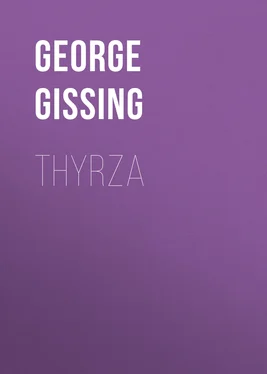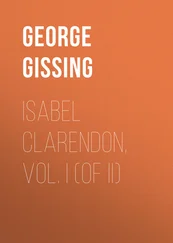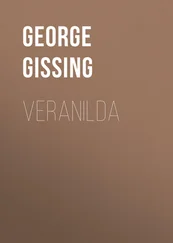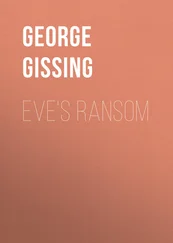George Gissing - Thyrza
Здесь есть возможность читать онлайн «George Gissing - Thyrza» — ознакомительный отрывок электронной книги совершенно бесплатно, а после прочтения отрывка купить полную версию. В некоторых случаях можно слушать аудио, скачать через торрент в формате fb2 и присутствует краткое содержание. Жанр: foreign_prose, literature_19, foreign_antique, на английском языке. Описание произведения, (предисловие) а так же отзывы посетителей доступны на портале библиотеки ЛибКат.
- Название:Thyrza
- Автор:
- Жанр:
- Год:неизвестен
- ISBN:нет данных
- Рейтинг книги:3 / 5. Голосов: 1
-
Избранное:Добавить в избранное
- Отзывы:
-
Ваша оценка:
- 60
- 1
- 2
- 3
- 4
- 5
Thyrza: краткое содержание, описание и аннотация
Предлагаем к чтению аннотацию, описание, краткое содержание или предисловие (зависит от того, что написал сам автор книги «Thyrza»). Если вы не нашли необходимую информацию о книге — напишите в комментариях, мы постараемся отыскать её.
Thyrza — читать онлайн ознакомительный отрывок
Ниже представлен текст книги, разбитый по страницам. Система сохранения места последней прочитанной страницы, позволяет с удобством читать онлайн бесплатно книгу «Thyrza», без необходимости каждый раз заново искать на чём Вы остановились. Поставьте закладку, и сможете в любой момент перейти на страницу, на которой закончили чтение.
Интервал:
Закладка:
'Why, I can't say as I know any real harm of her,' said her mother, 'unless it is as she's a Catholic.'
'Totty Nancarrow a Catholic!' exclaimed Ackroyd. 'Why, I never knew that.'
'Her mother was Irish, you see, an' I don't suppose as her father thought much about religion. I dessay there's some good people Catholics, but I can't say as I take much to them I know.'
Mary's face was expressing lively feeling.
'How can they be really good, mother, when their religion lets them do wrong, if only they'll go and confess it to the priest? I wouldn't trust anybody as was a Catholic. I don't think the religion ought to be allowed.'
Here was evidently a subject which had power to draw Mary from her wonted reticence. Her quiet eyes gleamed all at once with indignation.
Ackroyd laughed with good-natured ridicule.
'Nay,' he said, 'the time's gone by for that kind of thing, Miss Bower. You wouldn't have us begin religious persecution again?'
'I don't want to persecute anybody,' the girl answered; 'but I wouldn't let them be misled by a bad and false religion.'
On any other subject Mary would have expressed her opinion with diffidence; not on this.
'I don't want to be rude, Miss Mary,' Luke rejoined, 'but what right have you to say that their religion's any worse or falser than your own?'
'Everybody knows that it is—that cares about religion at all,' Mary replied with coldness and, in the last words, a significant severity.
'It's the faith, Mary, my dear,' interposed Mr. Boddy, 'the faith's the great thing. I don't suppose as form matters so much.'
The girl gave the old man a brief, offended glance, and drew into herself.
'Well,' said Mrs. Bower, 'that's one way o' lookin' at it but I can't see neither as there's much good in believin' what isn't true.'
'That's to the point, Mrs. Bower,' said Ackroyd with a smile.
There was a footstep in the shop—firm, yet light and quick—then a girl's face showed itself at the parlour door. It was a face which atoned for lack of regular features by the bright intelligence and the warmth of heart that shone in its smile of greeting. A fair broad forehead lay above well-arched brows; the eyes below were large and shrewdly observant, with laughter and kindness blent in their dark depths. The cheeks were warm with health; the lips and chin were strong, yet marked with refinement; they told of independence, of fervid instincts; perhaps of a temper a little apt to be impatient. It was not an imaginative countenance, yet alive with thought and feeling—all, one felt, ready at the moment's need—the kind of face which becomes the light and joy of home, the bliss of children, the unfailing support of a man's courage. Her hair was cut short and crisped itself above her neck; her hat of black straw and dark dress were those of a work-girl—poor, yet, in their lack of adornment, suiting well with the active, helpful impression which her look produced.
'Here's Mary an' Mr. Hackroyd fallin' out again, Lydia,' said Mrs. Bower.
'What about now?' Lydia asked, coming in and seating herself. Her eyes passed quickly over Ackroyd's face and rested on that of the old man with much kindness.
'Oh, the hold talk—about religion.'
'I think it 'ud be better if they left that alone,' she replied, glancing at Mary.
'You're right, Miss Trent,' said Luke. 'It's about the most unprofitable thing anyone can argue about.'
'Have you had your tea?' Mrs. Bower asked of Lydia.
'No; but I mustn't stop to have any, thank you, Mrs. Bower. Thyrza 'll think I'm never coming home. I only looked in just to ask Mary to come and have tea with us tomorrow.'
Ackroyd rose to depart.
'If I see Holmes I'll tell him you'll look in on Monday, Mr. Boddy.'
'Thank you, Mr. Ackroyd, thank you; no fear but I'll be there, sir.'
He nodded a leave-taking and went.
'Some work, grandad?' Lydia asked, moving to sit by Mr. Boddy.
'Yes, my dear; the thing as keeps the world a-goin'. How's the little 'un?'
'Why, I don't think she seems very well. I didn't want her to go to work this morning, but she couldn't make up her mind to stay at home. The hot weather makes her restless.'
'It's dreadful tryin'!' sighed Mrs. Bower.
'But I really mustn't stay, and that's the truth.' She rose from her chair. 'Where do you think I've been, Mary? Mrs. Isaacs sent round this morning to ask if I could give her a bit of help. She's going to Margate on Monday, and there we've been all the afternoon trimming new hats for herself and the girls. She's given me a shilling, and I'm sure it wasn't worth half that, all I did. You'll come tomorrow, Mary?'
'I will if—you know what?'
'Now did you ever know such a girl!' Lydia exclaimed, looking round at the others. 'You understand what she means, Mrs. Bower?'
'I dare say I do, my dear.'
'But I can't promise, Mary. I don't like to leave Thyrza always.'
'I don't see why she shouldn't come too,' said Mary. Lydia shook her head.
'Well, you come at four o'clock, at all events, and we'll see all about it. Good-bye, grandad.'
She hurried away, throwing back a bright look as she passed into the shop.
Paradise Street runs at right angles into Lambeth Walk. As Lydia approached this point, she saw that Ackroyd stood there, apparently waiting for her. He was turning over the leaves of one of his books, but kept glancing towards her as she drew near. He wished to speak, and she stopped.
'Do you think,' he said, with diffidence, 'that your sister would come out to-morrow after tea?'
Lydia kept her eyes down.
'I don't know, Mr. Ackroyd,' she answered. 'I'll ask her; I don t think she's going anywhere.'
'It won't be like last Sunday?'
'She really didn't feel well. And I can't promise, you know Mr. Ackroyd.'
She met his eyes for an instant, then looked along the street There was a faint smile on her lips, with just a suspicion of some trouble.
'But you will ask her?'
'Yes, I will.'
She added in a lower voice, and with constraint:
'I'm afraid she won't go by herself.'
'Then come with her. Do! Will you?'
'If she asks me to, I will.'
Lydia moved as if to leave him, but he followed.
'Miss Trent, you'll say a word for me sometimes?'
She raised her eyes again and replied quickly:
'I never say nothing against you, Mr. Ackroyd.'
'Thank you. Then I'll be at the end of the Walk at six o'clock, shall I?'
She nodded, and walked quickly on. Ackroyd turned back into Paradise Street. His cheeks were a trifle flushed, and he kept making nervous movements with his head. So busy were his thoughts that he unconsciously passed the door of the house in which he lived, and had to turn when the roar of a train passing over the archway reminded him where he was.
CHAPTER IV
THYRZA SINGS
Lydis, too, betrayed some disturbance of thought as she pursued her way. Her face was graver than before: once or twice her lips moved as if she were speaking to herself.
After going a short distance along Lambeth Walk, she turned off into a street which began unpromisingly between low-built and poverty-stained houses, but soon bettered in appearance. Its name is Walnut Tree Walk. For the most part it consists of old dwellings, which probably were the houses of people above the working class in days when Lambeth's squalor was confined within narrower limits. The doors are framed with dark wood, and have hanging porches. At the end of the street is a glimpse of trees growing in Kennington Road.
To one of these houses Lydia admitted herself with a latch-key; she ascended to the top floor and entered a room in the front. It was sparely furnished, but with a certain cleanly comfort. A bed stood in one corner; in another, a small washhand-stand; between them a low chest of drawers with a looking-glass upon it. The rest was arranged for day use; a cupboard kept out of sight household utensils and food. Being immediately under the roof, the room was much heated after long hours of sunshine. From the open window came a heavy scent of mignonette.
Читать дальшеИнтервал:
Закладка:
Похожие книги на «Thyrza»
Представляем Вашему вниманию похожие книги на «Thyrza» списком для выбора. Мы отобрали схожую по названию и смыслу литературу в надежде предоставить читателям больше вариантов отыскать новые, интересные, ещё непрочитанные произведения.
Обсуждение, отзывы о книге «Thyrza» и просто собственные мнения читателей. Оставьте ваши комментарии, напишите, что Вы думаете о произведении, его смысле или главных героях. Укажите что конкретно понравилось, а что нет, и почему Вы так считаете.












